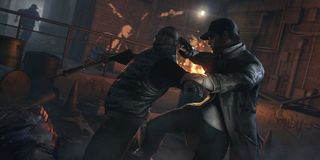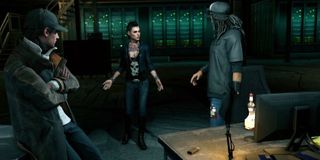
Early in Watch Dogs' campaign, a character comes close to summing up the game in nine words.
"You're always so grim," he tells hero Aiden Pearce. "Don't you ever loosen up?"
Yes, Aiden does loosen up on occasion. He's got some interesting hobbies, like running over condemned souls with a hot rod from hell or destroying the city with a spider tank. These are just virtual reality minigames, though. Once they're over, Aiden returns to his bleak life as a vigilante.
Watch Dogs feels as though it was built on the same assembly line as Far Cry 3 and the Assassin's Creed series. Aiden, like so many Ubisoft heroes that came before him, is a man who uses any means necessary to get revenge. He climbs towers (again with the towers?) to scout out regions for targets. If he needs a break from his quest for vengeance, he can take on optional jobs to test his basic skills like combat or stealth. These side gigs give him extra money and progression points that in turn make the campaign easier.
Chicago's a setting worthy of a game. Its depiction in Watch Dogs isn't very memorable, though. Ubisoft made a visual recreation of the city, threw in some randomly generated NPC's and called it a day. Chicago in this game just doesn't feel as "alive" as urban centers in other sandbox games.
Maybe the issue is Watch Dogs' lack of tone. The game doesn't have the satirical qualities of Saints Row or GTA or the comic book fantasy of Prototype and inFamous. The Chicago of Watch Dogs goes for realism and ends up kind of boring. Like Aiden, it's too busy being serious. The only compliment to pay Watch Dogs' Chicago is that it kinda looks like Chicago.
The only distinguishing characteristic of the city is the central operating system, or CtOS. The CtOS ties together all of Chicago's electronics like traffic lights and security cameras, ostensibly to make them safe from hackers. This suggests that the city government is obsessed with security and willing to sacrifice citizens' liberty to ensure it.
CINEMABLEND NEWSLETTER
Your Daily Blend of Entertainment News

The idea of a city on the brink of becoming a police state sounds intriguing but the CtOS is the only expression of that idea. Watch Dogs' Chicago is regular old Chicago aside from that invention. Citizens seem to be completely unfazed by the supercomputer monitoring them. They're also not bothered by reports that someone is hacking the very system implemented to stop hackers and using it to steal their money, access their personal information or blow up parts of their city. No wonder the city doesn't feel alive - it doesn't even make sense.
The hacker in question is our hero, Aiden. Through his smartphone he can tap into the CtOS to manipulate various electronic devices. He can raise bridges, change traffic lights, or stop trains. His hacking skill also turns him into the ultimate voyeur, allowing him to eavesdrop on phone conversations or access personal data on fellow citizens.
The hacking is executed smoothly. It's just a matter of aiming at the object you want to hack and then holding a button. The aiming is generous, allowing you to easily pull off hacks in the heat of a gun battle or car chase. For example, you can change the traffic light to stop pursuing cars without turning your camera up at the light.
This mastery over electronics can be thrilling. The silent, invisible nature of this power somehow makes it more satisfying. You're pulling the strings of the city without anyone knowing. You can steal money, blow things up and cause "accidents" while standing on a street corner. Hacking in Watch Dogs is a collection of surprise attacks you can launch at any time.
The bag of tricks offered by hacking isn't deep enough to sustain the game on its own, though. Most missions just boil down to sneaking, car chases or gunfights. Hacking is often an optional afterthought. You can blow up a circuit box next to a guard to take him out or hack a nearby car alarm to distract him while you slip by. In some cases, the attempts to tie hacking into the other gameplay feel like a stretch. Can I really hack the explosives on someone's belt, or the steam pipe behind him?
The missions that do put hacking front and center do so in limited ways. All too often, you'll find yourself hacking a camera so you can use it to spot some switch to flip. Or hacking a camera to spot another camera to hack that can find the switch to flip. Hacking is exciting when you're freely roaming Chicago but it's downright dull in the missions.

There's nothing wrong with having a game that has stealth, driving and shooting. However, if you're going to make these actions the main pillars of your game, they need to be well-executed and maybe original.
Watch Dogs doesn't manage to distinguish itself on these three fronts, though. As a shooter, it's generic as can be with genre staples like a slow-mo ability and snapping to cover. Stealth is better than I expected but has that all-too-common issue of every enemy knowing where you are once one of them does. Driving feels a little too loose, with cars slipping and sliding as though their tires don't have treads. Car chases lose their thrill when you realize that cops don't have boats so all you need to do to escape is jump in the water.
Multiplayer was another opportunity for Watch Dogs to set itself apart from the pack. The one-on-one mode Intrusion is the pick of the litter. One player tries to hack into another's phone while the other must locate and kill them before the process is complete. The way that it emphasizes slow, subtle manuevers by players reminds me a bit of the multiplayer from recent Assassin's Creed games. Being able to find and hack other players without leaving your own campaign is a nice touch, too.
The rest of the multiplayer fails to impress, though. Once you've finally got a handle on the game's driving, you can challenge other players to street races. Decryption is a sort of "kill the carrier" mode in which 3-8 players fight to control a piece of encrypted data - which just amounts to deathmatch with occasional car chases. These modes are obligatory rather than innovative. Ubisoft seems to have tossed them in to make the overall Watch Dogs package feel larger and therefore easier to sell.
Watch Dogs is filled with pleasant diversions like driving spider tanks and hacking other players. The best and most original parts of the game seem like they're on the edges of it, though. Ubisoft had some great ideas but couldn't commit to them, instead deciding to spend most of their time recreating Grand Theft Auto. Granted, it's a good recreation of GTA but the game could've been so much more than that.
The game set a one-day sales record for Ubisoft so there will almost certainly be a sequel. I hope they aim higher with Watch Dogs 2. Leave the formulas behind. Loosen up a bit.
Players: 1-8
Platforms: PS4, Xbox One, PS3, PC (reviewed), Xbox 360
Developer: Ubisoft
Publisher: Ubisoft
ESRB: Mature
Review Rating:

Staff Writer at CinemaBlend.

‘It’s Nuts’: Gladiator 2’s Joseph Quinn On Nerves When Jumping Into Ridley Scott’s Beloved Franchise

‘We Had No Idea How We Were Going To Do It’: Spider-Man 2 Producers Get Brutally Honest Remembering The Sequel’s Main Challenges As Fans Revisit It On The Big Screen

What's A Property Bros. Proposal Look Like? Jonathan Scott Reveals His Sweet 'Harvest Moon' Themed Scottish Proposal To Zooey Deschanel
Most Popular





